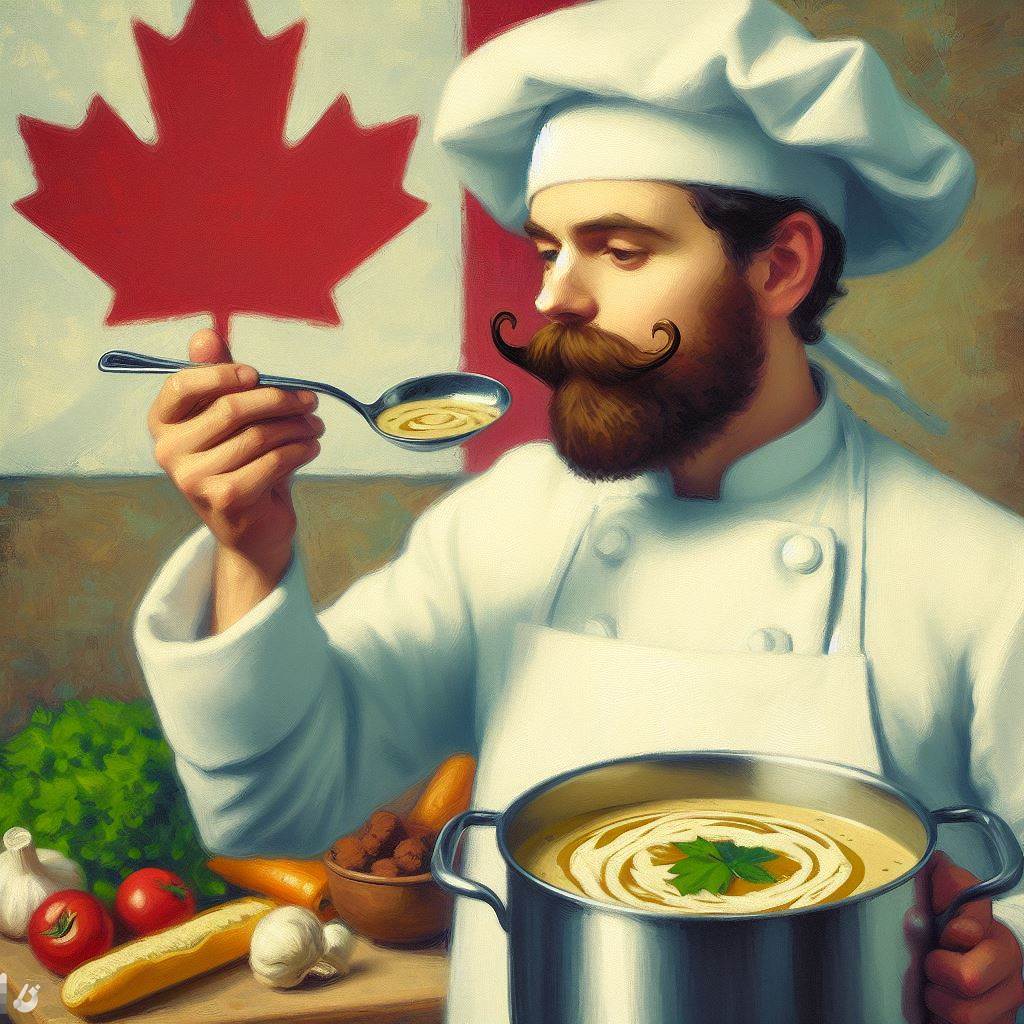Introduction
In Canada’s vibrant culinary landscape, mastering essential skills is the cornerstone for any aspiring chef.
These abilities are not mere prerequisites; they are the very essence of success in the demanding world of professional cooking.
From precision knife work to impeccable time management, a Canadian chef must be a virtuoso in the kitchen.
In the fast-paced culinary industry, where precision is paramount, knife skills stand out as a chef’s artistic signature.
A deft hand with a knife transforms raw ingredients into culinary masterpieces.
Beyond technical prowess, adaptability is crucial—Canadian chefs navigate diverse cuisines, reflecting the multicultural mosaic of the nation.
Precision extends beyond the cutting board; in the culinary realm, exact measurements and meticulous attention to detail are non-negotiable.
Canadian chefs, thus, must possess a keen sense of accuracy, ensuring every dish is a symphony of flavors.
Moreover, the ability to multitask seamlessly is a must, as a professional kitchen demands synchronization and efficiency.
In this competitive field, effective communication reigns supreme.
Canadian chefs must articulate their visions to the kitchen brigade, fostering teamwork and ensuring the seamless execution of gastronomic creations.
These skills are not just a recipe for success; they are the essential ingredients for crafting an illustrious culinary career in Canada.
Technical Skills
In order to excel in the culinary world, Canadian chefs must possess a range of technical skills.
These skills are essential for creating delicious and visually appealing dishes that leave a lasting impression on patrons.
Here are some of the specific technical skills that every Canadian chef must have:
Knife Skills
- Mastering knife skills is crucial for any chef. They must be able to handle knives with precision and confidence.
- Chopping, dicing, slicing, and mincing ingredients are all part of a chef’s daily routine.
- Proper knife techniques not only ensure consistent cuts but also minimize the risk of accidents in the kitchen.
Food Preparation and Cooking Techniques
- Chefs must possess a wide range of food preparation techniques to handle diverse ingredients.
- They need to understand the various cooking methods such as grilling, sautéing, boiling, and baking.
- Knowing the ideal cooking times and temperatures for different ingredients is essential for achieving perfect results.
- Understanding how to combine and balance flavors is crucial in creating well-rounded dishes.
Knowledge of Ingredients and Flavors
- Canadian chefs must have a deep knowledge of ingredients, including their origins, taste profiles, and seasonality.
- They need to stay updated with trends and the availability of local and international ingredients.
- Understanding flavor combinations and how different ingredients interact is vital for creating harmonious dishes.
Culinary Creativity and Innovation
- Being a chef is not just about following recipes; it’s about creating unique and memorable culinary experiences.
- Having creative flair allows chefs to experiment with new ingredients, cooking methods, and presentation styles.
- Constantly pushing boundaries and thinking outside the box is essential to stay relevant in the ever-evolving culinary world.
- Innovation is what sets exceptional chefs apart and keeps customers coming back for more.
Mastering these technical skills takes years of practice and dedication.
Canadian chefs must be willing to constantly learn and refine their techniques to stay at the top of their game.
The ability to execute these skills flawlessly not only demonstrates expertise but also enhances the overall dining experience of patrons.
So whether it’s perfectly julienning a carrot or crafting an impressive flavor combination, these technical skills are the backbone of every successful Canadian chef.
Time Management
Time management is a crucial skill that every Canadian chef must possess in order to excel in their role.
By effectively managing their time, chefs can ensure the smooth operation of the kitchen and ultimately achieve success in their culinary endeavors.
Significance of Time Management
Time management plays a significant role in a chef’s daily responsibilities.
In a fast-paced kitchen environment, where multiple tasks need to be completed within specific time frames, effective time management becomes essential.
It allows chefs to stay organized, focused, and efficient in their work.
Additionally, time management enables chefs to meet customers’ expectations by ensuring prompt service and timely delivery of meals.
It helps to maintain the quality of the dishes, as chefs have the necessary time to prepare and present them properly.
Time management also impacts the overall productivity and profitability of a restaurant.
Success through Efficient Time Management
Efficient time management directly contributes to a chef’s success in the kitchen.
By effectively utilizing the available time, chefs can enhance their productivity, creativity, and culinary skills.
Firstly, efficient time management allows chefs to handle multiple tasks simultaneously.
This ability to multitask helps them juggle various cooking processes, such as chopping ingredients, monitoring cooking times, and plating dishes, without compromising quality.
Secondly, by setting priorities and allocating time accordingly, chefs can complete tasks in a logical sequence.
They can focus on essential activities, such as meal preparations, inventory management, and staff supervision, ensuring smooth kitchen operations.
Furthermore, chefs who adhere to schedules and timelines can provide consistency in terms of food quality and service.
It enables them to deliver dishes promptly while maintaining the desired flavors, textures, and presentation.
Such consistency builds a loyal customer base and enhances the reputation of the chef and the restaurant.
Time Management Techniques for Chefs
Effective time management relies on certain techniques and strategies that chefs can adopt to optimize their daily routines.
Some of these techniques include:
Prioritizing tasks
Chefs should determine which tasks are most important and require immediate attention.
By prioritizing tasks, they can focus on critical activities and allocate time accordingly.
Creating schedules and timelines
Developing a well-structured schedule allows chefs to plan their day effectively.
They can allocate specific time slots for each task, considering factors like preparation time, cooking time, and plating.
Multi-tasking effectively
While multitasking can be challenging, chefs need to develop the ability to multitask efficiently.
By dividing complex tasks into smaller, manageable steps, they can work simultaneously on multiple tasks without compromising quality.
Basically, time management is an essential skill for every Canadian chef.
It enables them to stay organized, efficient, and focused in the fast-paced kitchen environment.
By mastering time management techniques, chefs can achieve success, deliver high-quality dishes, and ensure the overall productivity and profitability of the restaurant.
Read: The Role of Technology in Hotel Management
Communication Skills for Canadian Chefs
Effective communication is a crucial skill that every Canadian chef must possess in order to succeed in the culinary industry.
Not only does it ensure seamless operations in the kitchen, but it also contributes to building strong relationships with colleagues, engaging customers, and collaborating with suppliers and vendors.
In this section, we will highlight the importance of effective communication and discuss the different aspects of communication skills required in the culinary industry.
Importance of Effective Communication
Communication is the backbone of any successful kitchen and plays a vital role in ensuring smooth operations.
It allows chefs to effectively convey their culinary vision, expectations, and instructions to kitchen staff and colleagues.
Clear and concise communication helps to minimize errors, avoid misunderstandings, and maintain a harmonious work environment.
Furthermore, effective communication enhances customer interactions, allowing chefs to engage with customers, better understand their preferences, and provide exceptional dining experiences.
It also plays a significant role in collaborating with suppliers and vendors, ensuring that quality ingredients are sourced and delivered timely to the kitchen.
Aspects of Communication Skills in the Culinary Industry
1. Communicating with Kitchen Staff and Colleagues
Chefs must be able to articulate their expectations, delegate tasks, and provide clear instructions to kitchen staff.
This includes effective verbal communication, active listening, and the ability to give and receive constructive feedback.
Strong communication skills foster a positive work environment, improve teamwork, and boost overall productivity.
2. Engaging with Customers and Receiving Feedback
Interacting with customers requires excellent communication skills.
Chefs should be able to explain menu items, make recommendations, and address any customer concerns or dietary restrictions.
Additionally, actively seeking and valuing customer feedback helps chefs to understand their preferences, adapt their offerings, and continuously improve their culinary creations.
3. Collaborating with Suppliers and Vendors
Developing strong relationships with suppliers and vendors is crucial for chefs in ensuring the availability of quality ingredients.
Effective communication with these external stakeholders involves timely and accurate ordering, negotiation, and problem-solving.
Building rapport and maintaining open lines of communication contribute to long-term partnerships and reliable ingredient sourcing.
Unlock Your Career Potential
Visualize a clear path to success with our tailored Career Consulting service. Personalized insights in just 1-3 days.
Get StartedImproving Communication Skills
For aspiring chefs looking to enhance their communication skills, here are some essential tips:
1. Practice Active Listening
Pay attention and truly listen to what others are saying.
This encourages understanding, shows respect, and helps build stronger relationships in the kitchen and beyond.
2. Be Clear and Concise
Avoid ambiguity by using simple and precise language.
Clearly communicate expectations, instructions, and feedback to minimize misunderstandings and errors.
3. Seek Feedback
Regularly ask for feedback from colleagues, kitchen staff, and even customers.
Constructive criticism provides valuable insights and opportunities for growth.
4. Develop Emotional Intelligence
Understand and manage emotions effectively to foster positive interactions.
This includes controlling frustrations, staying calm under pressure, and being empathetic towards others.
5. Take Communication Training
Consider attending workshops or courses focused on effective communication.
These can provide techniques and strategies to improve both verbal and nonverbal communication skills.
Essentially, effective communication skills are indispensable for Canadian chefs.
Not only do they contribute to a well-functioning kitchen, but they also enable chefs to engage customers, collaborate with suppliers, and build strong relationships.
By practicing active listening, clarity, and seeking feedback, aspiring chefs can continuously improve their communication skills and excel in the culinary industry.
Read: Challenges Faced by Hotel Managers in Canada

Attention to Detail
In the world of culinary arts, attention to detail is an essential skill that every Canadian chef must possess.
It goes beyond just cooking delicious dishes; it is about providing an extraordinary dining experience for the customers.
This section will delve into the significance of attention to detail in culinary excellence.
Emphasizing the Role of Attention to Detail
- Attention to detail is what sets apart a good chef from an exceptional one.
- It involves focusing on every aspect of the cooking process, from selecting ingredients to plating the final dish.
- A chef with a keen eye for detail ensures consistency in taste, texture, and presentation.
- By paying attention to small details, a chef can achieve perfection even in the simplest of dishes.
Elevating the Quality of Dishes
- Small details, such as using the right amount of seasoning or cooking at the precise temperature, can make a significant difference in taste.
- Attention to detail allows the chef to bring out the best flavors and textures in each ingredient.
- It ensures that dishes are cooked to perfection, leaving no room for undercooked or overcooked elements.
- By paying attention to cooking times and techniques, a chef can achieve optimal flavors and textures.
- Attention to detail also extends to selecting the best quality ingredients, enhancing the overall quality of the dish.
The Importance of Presentation and Plate Arrangement:
- Attention to detail is imperative when it comes to the presentation of a dish.
- The way a dish looks plays a vital role in tempting and satisfying the customers.
- A chef must pay attention to the colors, textures, and arrangement of each element on the plate.
- By arranging the components thoughtfully, a chef can create a visually appealing and appetizing dish.
- Attention to detail in plate arrangement showcases the chef’s creativity and professionalism.
In general, attention to detail is an indispensable skill that every Canadian chef must possess.
It elevates the quality of dishes by ensuring consistency, optimal flavors, and textures.
Moreover, attention to detail in presentation and plate arrangement enhances the overall dining experience for the customers.
So, whether it’s the minute seasoning or the precise positioning of ingredients on the plate, every detail counts in the pursuit of culinary excellence.
Read: How to Excel in Hotel Management: Tips & Tricks
Adaptability and Problem-Solving
Adaptability is a crucial skill for Canadian chefs, given the dynamic nature of the culinary industry.
In an ever-changing environment, chefs must be able to adjust quickly and effectively to new situations and challenges.
With rapidly evolving food trends and customer preferences, adaptability ensures that chefs can remain competitive and provide high-quality dining experiences.
Common challenges and problems chefs face in a kitchen
In a kitchen, chefs face numerous challenges and problems on a daily basis.
From ingredient shortages and equipment malfunctions to demanding customers and tight deadlines, the kitchen can be a highly intense and stressful environment.
Chefs must be prepared to handle these obstacles efficiently and find effective solutions to ensure the smooth operation of the kitchen and the satisfaction of customers.
Importance of problem-solving skills in overcoming obstacles
Problem-solving skills are essential for chefs in overcoming these obstacles.
A chef must be able to think quickly and critically to identify the root cause of a problem and develop a solution.
Whether it’s a sudden decrease in kitchen staff, a change in menu ingredients, or a last-minute special request from a customer, problem-solving skills allow chefs to address these issues promptly and efficiently.
Examples of situations where adaptability and problem-solving skills are required.
There are countless situations where adaptability and problem-solving skills are required in the culinary industry.
For example, a chef may receive a delivery of subpar ingredients for a specific dish.
Instead of scrapping the dish altogether, an adaptable chef can improvise and create a new recipe using the available ingredients without compromising taste and quality.
Another scenario might involve a sudden surge of customers during a normally quiet period.
With limited staff and resources, a chef must find a way to expedite the cooking process without sacrificing the taste and presentation of dishes.
This may require reorganizing the kitchen workflow, prioritizing certain orders, and efficiently coordinating with the kitchen team to ensure smooth service.
Moreover, a chef may need to accommodate dietary restrictions or allergies of customers.
This requires adaptability in modifying recipes and ensuring that the dishes remain flavorful and appealing while adhering to specific dietary needs.
Furthermore, chefs often face unexpected events such as equipment breakdown.
In this situation, adaptability comes into play as chefs must find alternative methods or equipment to continue cooking without disrupting the operation.
An adaptable chef may also suggest creative solutions to prevent similar future breakdowns, such as routine maintenance or investing in backup equipment.
In essence, adaptability and problem-solving skills are indispensable for Canadian chefs in navigating the ever-changing culinary industry.
From handling daily challenges in the kitchen to adapting to evolving food trends, these skills enable chefs to provide exceptional dining experiences.
By continuously sharpening their problem-solving abilities and embracing adaptability, Canadian chefs can thrive in this dynamic and demanding profession.
Read: Navigating Hotel Management Career Paths
Find Out More: Sustainability Practices for Chefs in Canada
Leadership and Teamwork
In the culinary industry, leadership and teamwork are essential skills that every Canadian chef must have.
The role of leadership goes beyond just being in charge; it involves guiding and inspiring a kitchen team to work together efficiently.
The Role of Leadership
- A chef must be a leader who can provide direction and set clear goals for the kitchen team.
- Effective leadership creates a positive work environment, fostering creativity and productivity.
- Leadership encourages open communication and collaboration among team members.
- A chef’s leadership skills influence the overall success of the kitchen and the dining experience.
The Importance of Leading a Kitchen Team Effectively
- An efficient kitchen team is essential for ensuring smooth operations during busy service hours.
- Effective leadership helps to minimize errors, maintain consistent quality, and meet customer satisfaction.
- Leading a kitchen team effectively establishes a culture of accountability and responsibility.
- Leadership ensures that tasks are delegated properly and that each team member understands their role.
Tips on Developing Leadership Skills and Fostering Teamwork
Developing leadership skills and fostering teamwork in the kitchen environment is crucial for a chef’s career growth.
Here are some valuable tips:
1. Lead by Example
A chef must demonstrate high standards of professionalism, work ethic, and culinary skills. By being a role model, others will be motivated to follow suit.
2. Communicate Effectively
Clear and concise communication is essential to avoid misunderstandings and ensure that everyone is on the same page.
Regularly provide feedback and actively listen to team members.
3. Encourage Collaboration
Promote a team-focused environment where ideas are shared, and input from team members is valued.
Encourage cross-training and knowledge sharing among the kitchen staff.
4. Provide Opportunities for Growth
Offer professional development opportunities, such as workshops or seminars, to enhance the skills of your kitchen team.
Recognize their achievements and provide mentorship.
5. Foster a Positive Work Environment
Creating a positive and inclusive work environment boosts team morale and promotes productivity.
Encourage mutual respect, celebrate successes, and address conflicts promptly.
6. Delegate Tasks Wisely
Delegate tasks according to the strengths and skills of your team members. This ensures efficiency and allows individuals to excel in their respective areas.
7. Lead During Challenging Times
In difficult situations, such as high-pressure service or unexpected issues, a chef must remain calm and composed.
Provide guidance and support to your team to overcome challenges.
8. Continuous Learning
Stay updated with the latest culinary trends and techniques.
Encourage your team to enhance their knowledge and skills by providing resources and opportunities for learning.
In fact, leadership and teamwork are vital aspects of a chef’s career.
Developing strong leadership skills and fostering teamwork in the kitchen environment not only enhances performance but also creates a positive and collaborative work culture.
Continuous Learning and Growth
In order to be a successful chef in Canada, it is imperative to recognize the importance of continuous learning and professional development.
The culinary field is always evolving, and chefs must be adaptable and willing to expand their skills and knowledge.
Staying Updated with Current Food Trends and Techniques
One of the key aspects of continuous learning as a Canadian chef is staying updated with current food trends and techniques.
With ever-changing consumer preferences and culinary advancements, it is crucial for chefs to remain aware of the latest developments in the industry.
By keeping up with food trends, chefs can create innovative and appealing dishes that resonate with their customers.
This includes experimenting with new ingredients, flavors, and presentation styles.
Additionally, staying informed about the latest techniques allows chefs to refine their cooking skills and deliver high-quality culinary experiences.
Enhancing Skills and Knowledge through Courses, Workshops, and Networking
Canadian chefs can enhance their skills and knowledge by actively seeking out opportunities for professional development.
Attending courses and workshops specifically designed for chefs can provide valuable insights and practical learning experiences.
These educational programs often cover a wide range of topics, including advanced cooking techniques, culinary trends, nutrition, menu design, and food safety.
By participating in such courses, chefs can gain a deeper understanding of their craft and elevate their culinary skills to new heights.
Networking with other professionals in the culinary industry is another effective way to foster continuous learning.
By establishing connections and engaging in discussions with fellow chefs, chefs can exchange ideas, learn from each other’s experiences, and stay up-to-date with the latest industry news and trends.
Embracing New Experiences and Challenges
Continuous learning and growth also require chefs to step out of their comfort zones and embrace new experiences and challenges.
This can involve working in different culinary environments, such as fine dining restaurants, catering companies, or even food entrepreneurship.
By exposing themselves to different settings, chefs can broaden their skill set and gain valuable insights into diverse culinary practices.
Working with experienced chefs in various establishments can also provide mentorship opportunities, allowing aspiring chefs to learn from those with extensive industry knowledge.
The Path to Success: Never Stop Learning
Becoming a successful Canadian chef is not a destination but rather a lifelong journey.
The culinary field is constantly evolving, and staying relevant requires chefs to prioritize continuous learning and growth.
By actively seeking out opportunities to enhance their skills and knowledge, Canadian chefs can stay ahead of the game and deliver exceptional culinary experiences.
Embracing new experiences, networking, and staying updated with industry trends are all integral parts of this ongoing journey.
Ultimately, by committing to continuous learning and growth, Canadian chefs can solidify their position in the industry, inspire others, and contribute to the ever-evolving culinary landscape.
Conclusion
The essential skills every Canadian chef must have include creativity, attention to detail, adaptability, teamwork, and time management.
Aspiring chefs should prioritize the development of these skills to excel in their careers.
Becoming a chef is a rewarding and challenging profession that requires dedication and passion.
Embracing these essential skills will set chefs on a path to success and fulfillment in the culinary world.
Every day in the kitchen presents new opportunities for growth and exploration.
So, if you have a love for food and a desire to create unforgettable dining experiences, don’t hesitate to pursue a career as a Canadian chef.
With the right skills and mindset, you can achieve greatness in this exciting and ever-evolving field.
The culinary journey awaits you, ready to bring out the best version of yourself.




